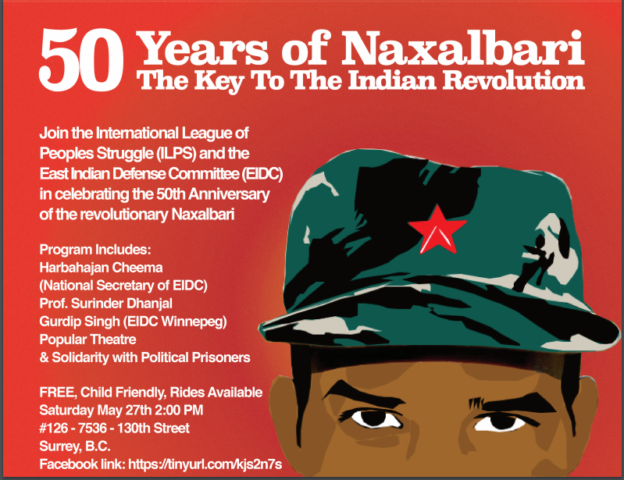50 Years of Naxalbari: The Key to the Indian Revolution
Saturday, May 27th from 2:00 to 5:00 PM
Progressive Cultural Centre (Unit 126 – 7536 130th Street), Surrey
Facebook event
On May 25, 1967, the people of Naxalbari, a village in West Bengal state in India, decided that they had enough of an oppressive feudal system. For years, they had been dealing with hunger and oppression as they tilled the land for their landlords for no return. With no change forthcoming, these villagers began a struggle against their landlords. This was the beginning of the Naxalbari Uprising, a new stage in the progressive struggle for national liberation in India against capitalist exploitation, imperialism, and oppression.
To celebrate this pivotal event in Indian history which gave millions of workers and peasants hope for liberation, and to reflect on the legacy of the Naxalbari Uprising for activists and revolutionaries worldwide, the International League of People’s Struggles in Canada and the East Indian Defence Committee are holding an event entitled “50 Years of Naxalbari: The Key to the Indian Revolution”. The event will be held on Saturday from 2–5 PM at the Progressive Cultural Centre (Unit 126 – 7536 130th Street) in Surrey. The venue is accessible by transit from Surrey Central station.
We hope to place the Naxalbari Uprising and the movement it launched in the context of other resistance movements around the world. The movement not only inspired other farmers who still suffer from feudal oppression to this day, but also among others who suffer under a capitalist system. Numerous student organizations in India, such as the Punjab Student Unions, bought the vision of Naxalbari to campuses in India. Naxalbari has also influenced the resistance of Adivasis (“tribals”) in resource-rich India against multinational mining corporations plundering their land in search of iron and coal. Naxalbari has produced leaders of the feminist movement in India such as the late Anuradha Ghandy, who espoused the idea of “proletarian feminism”. We also remember the struggles of Ghandy’s husband, Kobad Ghandy, as well as Comrade Ajith, and Prof. G. N. Saibaba. These activists are all political prisoners today who have been suppressed because of their solidarity with the oppressed peoples in India, and because of their outspoken criticisms of the growing fascism in India, as demonstrated by the actions of Modi’s BJP government and Operation Green Hunt.
The Naxalbari Uprising influenced arts and literature as well as politics. Novels such as Mahasweta Devi’s Mother of 1084 make reference to the state repression of the student movements in the aftermath of the Naxalbari Uprising. Famed novelist Arundhati Roy has also written an article titled “Walking with the Comrades”. Numerous films and documentaries have been produced about the movement which Naxalbari inspired, including Red Ant Dream.
We hope that all progressive people will join the event in order to celebrate the ongoing struggle for social and national liberation in India, and to be in solidarity with political prisoners and other freedom fighters there.




